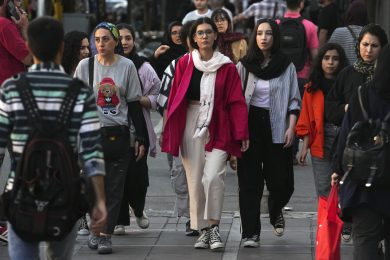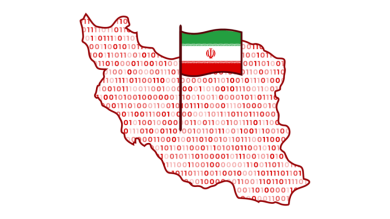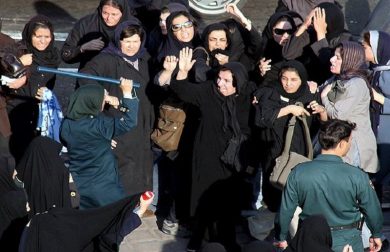The Islamic Revolutionary Guard Corps (IRGC) wields immense power in Iran, not only as a military and political force but also as a significant actor in controlling information and limiting digital freedoms. In an increasingly connected world, the internet has become a vital tool for communication, activism, and expression, particularly for those seeking to challenge oppressive regimes. For the IRGC, this connectivity represents both a threat to its authority and an opportunity to tighten its grip on society. Through censorship, surveillance, and cyber warfare, the IRGC has developed sophisticated methods to suppress digital freedom, stifle dissent, and maintain control over the Iranian populace.
This article delves into how the IRGC suppresses digital freedom in Iran, the tools and strategies it employs, and the broader implications for human rights and global security.
The Importance of Digital Freedom in Iran
Digital freedom in Iran represents a critical avenue for citizens to organize, share information, and challenge government narratives. Social media platforms, encrypted messaging apps, and independent news websites have become essential tools for activists, journalists, and ordinary citizens to expose corruption, organize protests, and advocate for human rights.
1. A Lifeline for Activism
• Platforms like Twitter, Instagram, and Telegram have been instrumental in mobilizing protests and amplifying the voices of activists. For example, during the 2022 protests following Mahsa Amini’s death, social media became a powerful tool for spreading information globally.
2. Countering State Propaganda
• Independent journalists and activists use digital platforms to counter state-controlled media and expose human rights abuses, including the IRGC’s violent crackdowns on dissent.
3. Building Global Solidarity
• Through online activism, Iranians connect with international audiences, garnering support and solidarity from around the world.
Despite these opportunities, the IRGC has aggressively sought to limit digital freedom, viewing the internet as both a battleground and a threat to its power.
The IRGC’s Tools of Digital Repression
The IRGC employs a range of tools and strategies to suppress digital freedom, combining censorship, surveillance, and cyberattacks to stifle dissent and maintain control over information.
1. Internet Censorship
The Iranian government, heavily influenced by the IRGC, enforces some of the most restrictive internet censorship policies in the world.
• Blocking Websites: Thousands of websites, including independent news outlets, social media platforms, and human rights organizations, are blocked in Iran. Platforms like Facebook, Twitter, and YouTube have been inaccessible for years without the use of VPNs.
• Filtering Content: Even platforms that are accessible, such as Instagram, are heavily monitored and filtered to remove content deemed “anti-regime” or “immoral.”
2. Internet Blackouts
During periods of unrest, the IRGC often enforces nationwide or regional internet blackouts to disrupt communication and conceal the regime’s violent crackdowns.
• 2019 Protests: Amid widespread protests over fuel price hikes, the IRGC orchestrated a near-total internet shutdown, cutting Iranians off from the outside world for nearly a week. This blackout allowed security forces to brutally suppress protests with minimal international scrutiny.
• 2022 Mahsa Amini Protests: Similar tactics were employed to suppress the wave of protests following Mahsa Amini’s death, with internet access severely restricted across the country.
3. Advanced Surveillance Technologies
The IRGC uses sophisticated surveillance tools to monitor online activity, identify dissenters, and suppress activism.
• Social Media Monitoring: The IRGC actively monitors platforms like Telegram, Instagram, and Twitter to identify individuals spreading anti-regime messages or organizing protests.
• Hacking and Phishing Attacks: Activists and journalists are frequently targeted by IRGC-affiliated hackers using phishing schemes to gain access to their accounts, gather sensitive information, and disrupt their activities.
• Facial Recognition Technology: The regime reportedly uses facial recognition to identify protesters and dissidents from photos and videos posted online.
4. Cyber Warfare
The IRGC also leverages cyber warfare tactics to target activists, opposition groups, and foreign entities.
• Disinformation Campaigns: The IRGC uses fake social media accounts and websites to spread propaganda, discredit activists, and sow division among opposition movements.
• Cyberattacks on Media Outlets: Independent news platforms that report on Iran’s human rights abuses are frequently targeted by IRGC-linked cyberattacks, often aimed at silencing dissenting voices.
Impact on Iranian Society
The IRGC’s suppression of digital freedom has profound consequences for Iranian society, undermining basic human rights and stifling efforts for reform.
1. Stifling Freedom of Expression
The IRGC’s policies effectively silence dissenting voices and prevent Iranians from freely expressing their views online. Activists, journalists, and ordinary citizens risk severe punishment for speaking out against the regime.
2. Hindering Activism
By limiting access to communication tools, the IRGC disrupts grassroots organizing efforts, making it more difficult for protests and movements to gain momentum.
3. Psychological Impact
Constant surveillance and the fear of reprisal create a climate of fear, discouraging many from engaging in activism or even expressing critical opinions online.
Global Implications of the IRGC’s Digital Repression
The IRGC’s digital repression extends beyond Iran’s borders, with significant implications for global security and human rights.
1. Exporting Digital Authoritarianism
The IRGC’s tactics serve as a model for other authoritarian regimes, contributing to the global erosion of digital freedoms. Countries like China and Russia have reportedly shared surveillance technology and strategies with Iran.
2. Targeting Exiled Activists
The IRGC frequently targets members of the Iranian diaspora, hacking their accounts, spreading disinformation, and attempting to intimidate them into silence.
3. Undermining International Cybersecurity
The IRGC’s cyberattacks on foreign entities, including governments and corporations, disrupt global systems and contribute to an increasingly volatile digital landscape.
How the Global Community Can Respond
Addressing the IRGC’s suppression of digital freedom requires a coordinated international effort that combines technological, diplomatic, and advocacy-based strategies.
1. Support for Digital Tools
• Provide Iranians with access to VPNs, encrypted messaging apps, and other tools to bypass censorship and protect their online activities.
• Fund organizations that develop technologies aimed at countering surveillance and censorship.
2. Diplomatic Pressure
• Governments and international organizations must hold Iran accountable for its violations of digital rights, including by imposing sanctions on IRGC-linked entities involved in cyber repression.
• Raise the issue of digital freedom in multilateral forums like the United Nations.
3. Amplifying Activist Voices
• Support independent media platforms and journalists working to expose the IRGC’s abuses.
• Highlight the stories of Iranian activists and dissidents to raise awareness and mobilize global solidarity.
4. Promoting Cybersecurity Collaboration
• Strengthen international cooperation to combat IRGC-linked cyberattacks and disinformation campaigns.
• Enhance cybersecurity measures to protect activists, journalists, and organizations targeted by the IRGC.
Conclusion
The IRGC’s suppression of digital freedom in Iran represents a grave threat to human rights, free expression, and global security. By controlling access to information, monitoring online activity, and employing cyber warfare tactics, the IRGC seeks to stifle dissent and maintain its grip on power. However, the resilience of Iranian activists, combined with global solidarity and technological innovation, offers hope for reclaiming digital spaces as tools for freedom and change. The international community must act decisively to support Iranian citizens in their fight for digital freedom and ensure that the internet remains a platform for expression, activism, and connection.
Join Our Newsletter!
Stay informed with the latest updates, news, and ways to take action in the fight for justice and global security. Sign up now to get updates delivered straight to your inbox!





